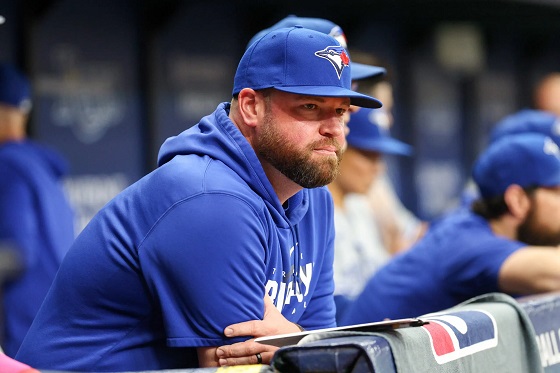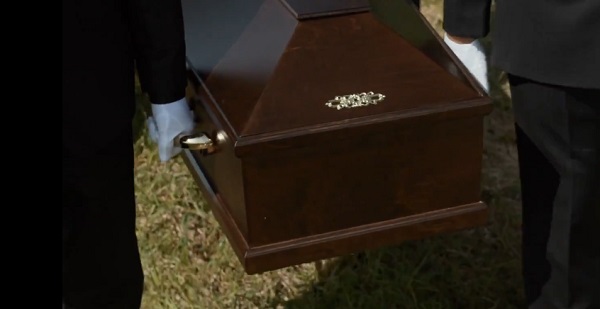Autism
UK plans to test children with gender confusion for autism
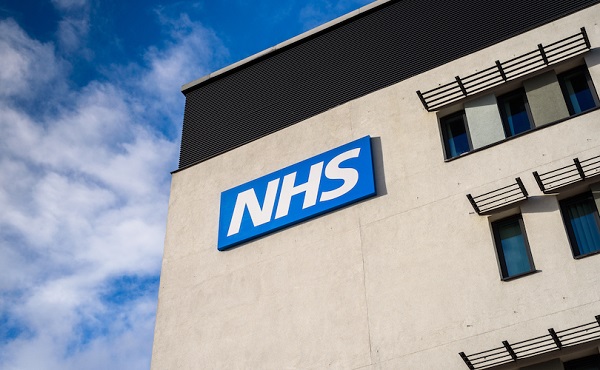
From LifeSiteNews
All children referred to a ‘gender clinic’ in the UK will soon be screened for autism and other ‘neurodevelopmental conditions’ due to the high rate of autism among gender-confused people.
According to The Telegraph, the National Health Service has drafted plans to test all children who believe they are “transgender” for autism due to findings in the Cass Review, which noted that “mental health conditions were disproportionately common among children and young people with gender dysphoria.”
“Every child referred to a gender clinic will be ‘screened for neurodevelopmental conditions’ such as autism and ADHD under new guidance,” The Telegraph reported. “Medics will also evaluate each child’s mental health, their relationship with their family and their sexual development, including whether they are experiencing same-sex attraction.”
Many parents, experts, and psychiatrists have been calling for such screenings for years, but transgender activists pushing the so-called “gender-affirming care” model refused to consider the intersection of autism and other factors and gender dysphoria. Consequently, many parents have seen their autistic children sucked into the gender ideology; the newsletter Parents with Inconvenient Truths about Trans has published heartbreaking stories almost weekly.
The NHS will now be moving away from the “medical model” or “gender-affirming care” to a “holistic” approach. This new guidance will be released for public consultation shortly and come into effect later in 2025. According to The Telegraph:
However, some groups criticized a “serious flaw” in the policy as it leaves an open door to the use of cross-sex hormones. They also condemned its absence of recognition of the wider societal issues to which children are exposed. The new NHS Children and Young People’s Gender Service will explore eight key areas of a child’s life.
To assess “development”, doctors will take a “detailed history” of the child’s social, cognitive and physical growth, particularly because of the “substantial” changes that take place during puberty. They will screen children for autism and learning disabilities and look into whether further “cognitive assessments” are necessary.
The specification says: “Given the high prevalence of neurodiversity identified within this population, all those attending the NHS Children and Young People’s Gender Service should receive screening for neurodevelopmental conditions.” The “multidisciplinary team” of experts, including a consultant specializing in neurodevelopmental disorders, will create a treatment plan for each individual depending on their diagnosis.
If, during the screening, a “neurodevelopmental condition” is identified, a referral to the Paediatric Neurodevelopmental Service or Paediatric ASD Service will be likely, according to the guidance. Physicians will seek to determine whether the child’s symptoms are a result of underlying conditions or gender dysphoria, and their conditions will be reviewed longer term. Dr. Michael Craig, the clinical lead from the NHS National Autism Unit from 2007 to 2023, “previously estimated half of patients seen by Tavistock’s clinic had autism after observing sessions.”
Hilary Cass observed the same trend, noting that one study found that autism was a “common denominator” in people identifying as transgender, with a recent study determining that gender-confused people were three to six times more likely to be autistic. The spike in girls identifying as transgender, Cass noted, was in part due to “undiagnosed autism, which is often missed in adolescent girls.” The new NHS guidance noted that there has been a “reluctance to explore or address” mental health issues, in part because gender dysphoria has not been classified as a mental illness under the “gender-affirming care” model.
The new holistic NHS approach will also include examining the social context of children struggling with gender dysphoria:
Another key area is dubbed “family context”, with medics being tasked to paint a picture of each child’s upbringing and familial relationships. The specification noted that “there is evidence of an increased frequency of family parental physical and/or mental ill health and other family stressors in this group”.
Under the section titled sexual development, knowledge and sexual orientation, it said “clinicians should seek to understand the child/young person’s emerging sexuality and sexual orientation”. If this has been a previous issue, doctors should consider whether the child was exposed to “adversity and trauma”. They will also examine the children’s physical health needs and the impact of any long-term conditions, along with their broader well-being, school relationships and educational attainment.
Critics of “gender-affirming care” have been enthusiastic about this proposed guidance, with Dr. Louise Irvine of the Clinical Advisory Network on Sex and Gender telling The Telegraph that: “The new service recognizes that many also experience mental health, neurodevelopmental and/or personal, family or social complexities in their lives. The challenge will be to ensure NHS services can provide prompt access to appropriate service for any identified needs as waiting lists are currently very long.” Irvine did note the “serious flaw” in the guidance being that it “leaves the door open for referral of children and young people under 18 for cross-sex hormones,” which she called unscientific and “irresponsible.”
Autism
Trump Blows Open Autism Debate
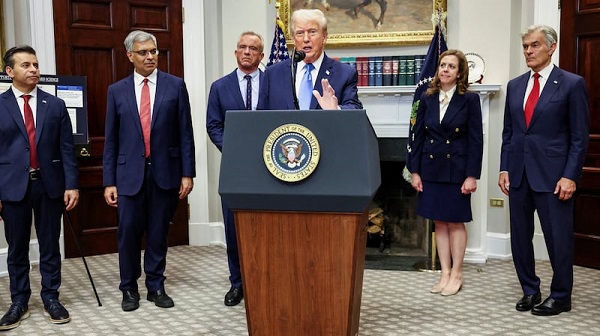
From the Brownstone Institute
By
Trump made sweeping claims that would have ended political careers in any other era. His health officials tried to narrow the edges, but the President ensured that the headlines would be his.
Autism has long been the untouchable subject in American politics. For decades, federal agencies tiptoed around it, steering research toward genetics while carefully avoiding controversial environmental or pharmaceutical questions.
That ended at the White House this week, when President Donald Trump tore through the taboo with a blunt and sometimes incendiary performance that left even his own health chiefs scrambling to keep pace.
Flanked by Health Secretary Robert F. Kennedy, Jr., NIH Director Jay Bhattacharya, FDA Commissioner Marty Makary, CMS Adminstrator Dr Mehmet Oz, and other senior officials, Trump declared autism a “horrible, horrible crisis” and recounted its rise in startling terms.
“Just a few decades ago, one in 10,000 children had autism…now it’s one in 31, but in some areas, it’s much worse than that, if you can believe it, one in 31 and…for boys, it’s one in 12 in California,” Trump said.
The President insisted the trend was “artificially induced,” adding: “You don’t go from one in 20,000 to one in 10,000 and then you go to 12, you know, there’s something artificial. They’re taking something.”
Trump’s Blunt Tylenol Warning
The headline moment came when Trump zeroed in on acetaminophen, the common painkiller sold as Tylenol — known as paracetamol in Australia.
While Kennedy and Makary described a cautious process of label changes and physician advisories, Trump dispensed with nuance.
“Don’t take Tylenol,” Trump said flatly. “Don’t take it unless it’s absolutely necessary…fight like hell not to take it.”
Kennedy laid out the evidence base, citing “clinical and laboratory studies that suggest a potential association between acetaminophen used during pregnancy and adverse neurodevelopmental outcomes, including later diagnosis for ADHD and autism.”
Makary reinforced the point with references to the Boston Birth Cohort, the Nurses’ Health Study, and a recent Harvard review, before adding: “To quote the dean of the Harvard School of Public Health, there is a causal relationship between prenatal acetaminophen use and neurodevelopmental disorders of ADHD and autism spectrum disorder. We cannot wait any longer.”
But where the officials spoke of “lowest effective dose” and “shortest possible duration,” Trump thundered over the top: “I just want to say it like it is, don’t take Tylenol. Don’t take it if you just can’t. I mean, it says, fight like hell not to take it.”
Vaccines Back on Center Stage
The President then pivoted to vaccines, reviving arguments that the medical establishment has long sought to bury. He blasted the practice of giving infants multiple injections at a single visit.
“They pump so much stuff into those beautiful little babies, it’s a disgrace…you get a vat of 80 different vaccines, I guess, 80 different blends, and they pump it in,” Trump said.
His solution was simple: “Go to the doctor four times instead of once, or five times instead of once…it can only help.”
On the measles, mumps, and rubella shot, Trump insisted: “The MMR, I think should be taken separately…when you mix them, there could be a problem. So there’s no downside in taking them separately.”
The moment was astonishing — echoing arguments that had once seen doctors like Andrew Wakefield excommunicated from medical circles.
It was the kind of line of questioning the establishment had spent decades trying to banish from mainstream debate.
Hep B Vaccine under Attack
Trump dismissed the rationale for giving the hepatitis B vaccine at birth.
“Hepatitis B is sexually transmitted. There’s no reason to give a baby that’s just born hepatitis B [vaccine]. So I would say, wait till the baby is 12 years old,” he said.
He made clear that he was “not a doctor,” stressing that he was simply offering his personal opinion. But the move could also be interpreted as Trump choosing to take the heat himself, to shield Kennedy’s HHS from what was sure to be an onslaught of criticism.
The timing was remarkable.
Only last week, the CDC’s Advisory Committee on Immunisation Practices (ACIP) had been preparing to vote on whether to delay the hepatitis B shot until “one month” of age — a modest proposal that mainstream outlets derided as “anti-vax extremism.”
By contrast, Trump told the nation to push the jab back 12 years. His sweeping denunciations made the supposedly radical ACIP vote look almost tame.
The irony was inescapable — the same media voices who had painted Kennedy’s reshaped ACIP as reckless now faced a President willing to say far more than the panel itself dared.
A New Treatment and Big Research Push
The administration also unveiled what it deemed a breakthrough: FDA recognition of prescription leucovorin, a folate-based therapy, as a treatment for some autistic children.
Makary explained: “It may also be due to an autoimmune reaction to a folate receptor on the brain not allowing that important vitamin to get into the brain cells…one study found that with kids with autism and chronic folate deficiency, two-thirds of kids with autism symptoms had improvement and some marked improvement.”
Dr Oz confirmed Medicaid and CHIP (the Children’s Health Insurance Program, which provides low-cost health coverage to children in families that earn too much to qualify for Medicaid) would cover the treatment.
“Over half of American children are covered by Medicaid and CHIP…upon this label change…state Medicaid programs will cover prescription leucovorin around the country, it’s yours,” said Oz.
Bhattacharya announced $50 million in new NIH grants under the “Autism Data Science Initiative.”
He explained that 13 projects would be funded using “exposomics” — the study of how environmental exposures like diet, chemicals, and infections interact with our biology — alongside advanced causal inference methods.
“For too long, it’s been taboo to ask some questions for fear the scientific work might reveal a politically incorrect answer,” Bhattacharya said. “Because of this restricted focus in scientific investigations, the answers for families have been similarly restricted.”
Mothers’ Voices
The press conference also featured raw testimony from parents.
Amanda, mother of a profoundly autistic five-year-old, told Trump: “Unless you’ve lived with profound autism, you have no idea…it’s a very hopeless feeling. It’s very isolating. Being a parent with a profound autistic child, even just taking them over to your friend’s house is something we just don’t do.”
Jackie, mother of 11-year-old Eddie, said: “I’ve been praying for this day for nine years, and I’m so thankful to God for bringing the administration into our lives…I never thought we would have an administration that was courageous enough to look into things that no prior administration had.”
Their stories underscored what Kennedy said at the announcement about “believing women.” Here were mothers speaking directly about their lived reality, demanding that uncomfortable conversations could no longer be avoided.
Clashes with the Press Corps
Reporters pressed Trump on the backlash from medical groups.
Asked about the American College of Obstetricians and Gynecologists (ACOG) declaring acetaminophen safe in pregnancy, Trump shot back, “That’s the establishment. They’re funded by lots of different groups. And you know what? Maybe they’re right. I don’t think they are, because I don’t think the facts bear it out at all.”
When one journalist raised the argument that rising diagnoses reflected better recognition, Kennedy bristled,
“That’s one of the canards that has been promoted by the industry for many years,” he said. “It’s just common sense, because you’re only seeing this in people who are under 50 years of age. If it were better recognition or diagnosis, you’d see it in the seventy-year-old men. I’ve never seen this happening in people my age.”
Another reporter then asked Trump, “Should the establishment media show at least some openness to trying to figure out what the causes are?”
“I wish they would. Yeah, why are they so close-minded?” Trump replied. “It’s not only the media, in all fairness, it’s some people, when you talk about vaccines, it’s crazy…I don’t care about being attacked.”
Breaking the Spell
For years, autism policy has been shaped by caution, consensus, and deference to orthodox positions. That spell was broken at today’s press conference.
The dynamic was striking. Kennedy, Makary, Bhattacharya, and Oz leaned on scientific papers, review processes, and cautious advisories. Trump, by contrast, brushed it all aside, hammering his message home through repetition and personal anecdotes.
Trump made sweeping claims that would have ended political careers in any other era. His health officials tried to narrow the edges, but the President ensured that the headlines would be his.
“This will be as important as any single thing I’ve done,” Trump declared. “We’re going to save a lot of children from a tough life, really tough life. We’re going to save a lot of parents from a tough life.”
Whatever the science ultimately shows, the politics of autism in America will never be the same.
Republished from the author’s Substack
Autism
Secretary Kennedy’s Key Remark at Autism Press Conference
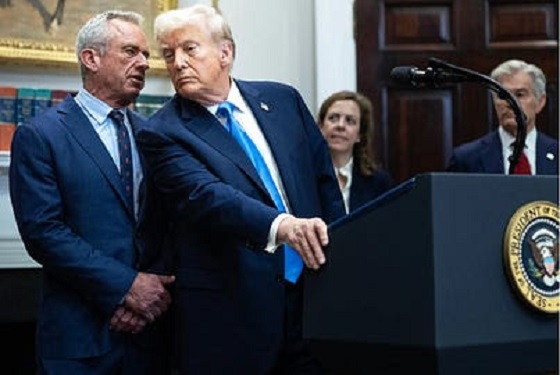
By John Leake
“Some 40% to 70% of mothers who have children with autism believe that their child was injured by a vaccine.”
Within medical freedom circles, much of the commentary on the September 22 press conference has focused on Tylenol being presented as the prime suspect for the autism epidemic.
While President Trump’s medical advisors chose to focus exclusively on Tylenol—therefore revealing that they have, to some degree, been captured by the Vaccine Cartel—HHS Secretary Kennedy managed to make what I believe to be the most important statement of the press conference.
Finally, autism is a complex disorder with multifactorial etiology. We are continuing to investigate a multiplicity of potential causes where no areas of taboo. One area that we are closely examining, as the president mentioned, is vaccines. Some 40% to 70% of mothers who have children with autism believe that their child was injured by a vaccine. President Trump believes that we should be listening to these mothers instead of gaslighting and marginalizing them, like prior administrations.
As Andy Wakefield has been saying for almost thirty years, the key to determining the cause of autism lies in the witness testimony of mothers.
In the matter of autism, mothers are the best witnesses because they “keep their attention fixed upon what lies nearest”—namely, the behavior, moods, and health of their infants.
It is an astonishing fact that almost none of the literature on autism devotes serious attention to case studies like that of Hannah Poling, documented by J.S. Poling, A.W. Zimmerman et al. in their seminal paper Developmental regression and mitochondrial dysfunction in a child with autism.
For the record, in the case of Hannah Poling, the U.S. Court of Federal Claims acknowledged—albeit in a deal it tried to keep secret—that the girl’s regression into autism had been caused by a large number of vaccines administered all at once.
As we document in our new book, Vaccines: Mythology, Ideology, and Reality, Hannah’s parents are far from being alone. Thousands of parents have told similar stories. Hannah’s father, Dr. Jon Poling, had the advantage of being a neurologist at the Department of Neurology and Neurosurgery at Johns Hopkins Hospital, so the U.S. government found his witness testimony impossible to dismiss.
Contrast the common practice of dismissing parents’ testimony in the matter of autism with our standard methods for investigating child abductions. When a child doesn’t come home from school, a detective doesn’t start by consulting the literature on criminology and criminal psychology. No, he interviews the child’s parents and teachers to establish a timeline and to learn about the child’s activities, social circles, habits, and interests.
At the McCullough Foundation, we are forging a new path, beyond the obscurantism of the high priesthood that has controlled the discourse about autism since it waged its calumnious campaign against Dr. Andrew Wakefield twenty years ago.
We are now getting organized to conduct a major case series study on children who had normal births, achieved all developmental milestones during their first twelve to nineteen months of life, but then regressed into autism. Though we will be very thorough and searching in our questions, our inquiry will be guided by the imperative to listen to the mothers.
This will be a major, time consuming enterprise, and we can use your support. Please click on the image below to make a tax-free donation. If you would like to donate more than $1,000., please mail a check to our McCullough Foundation office.
6320 Lyndon B. Johnson Fwy, Suite 221/ Dallas, Texas, 75240
If you are contemplating making a major donation and would like to learn about our work in greater detail, please email me at johnsearsleake@mcculloughfnd.
Subscribe to FOCAL POINTS (Courageous Discourse).
For the full experience, upgrade your subscription.
-

 Health1 day ago
Health1 day agoLack of adequate health care pushing Canadians toward assisted suicide
-

 National1 day ago
National1 day agoWatchdog Demands Answers as MP Chris d’Entremont Crosses Floor
-

 Alberta1 day ago
Alberta1 day agoATA Collect $72 Million in Dues But Couldn’t Pay Striking Teachers a Dime
-

 Artificial Intelligence1 day ago
Artificial Intelligence1 day agoAI Faces Energy Problem With Only One Solution, Oil and Gas
-

 Artificial Intelligence1 day ago
Artificial Intelligence1 day agoAI seems fairly impressed by Pierre Poilievre’s ability to communicate
-

 Media1 day ago
Media1 day agoBreaking News: the public actually expects journalists to determine the truth of statements they report
-

 Dr John Campbell2 days ago
Dr John Campbell2 days agoCures for Cancer? A new study shows incredible results from cheap generic drug Fenbendazole
-

 Business20 hours ago
Business20 hours agoLiberal’s green spending putting Canada on a road to ruin











